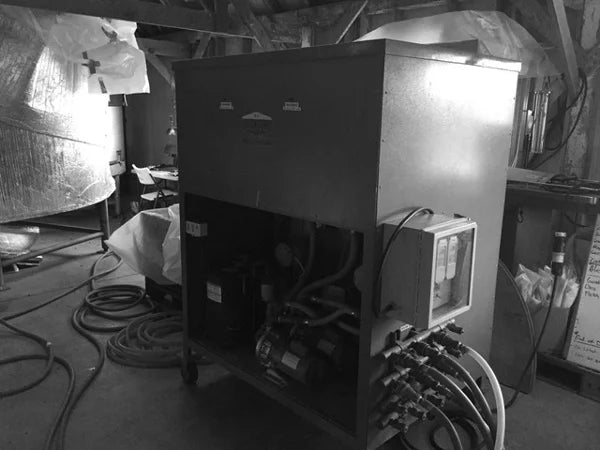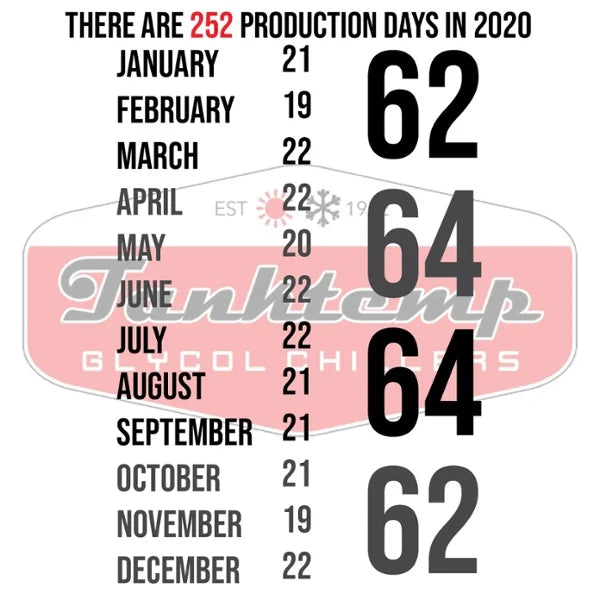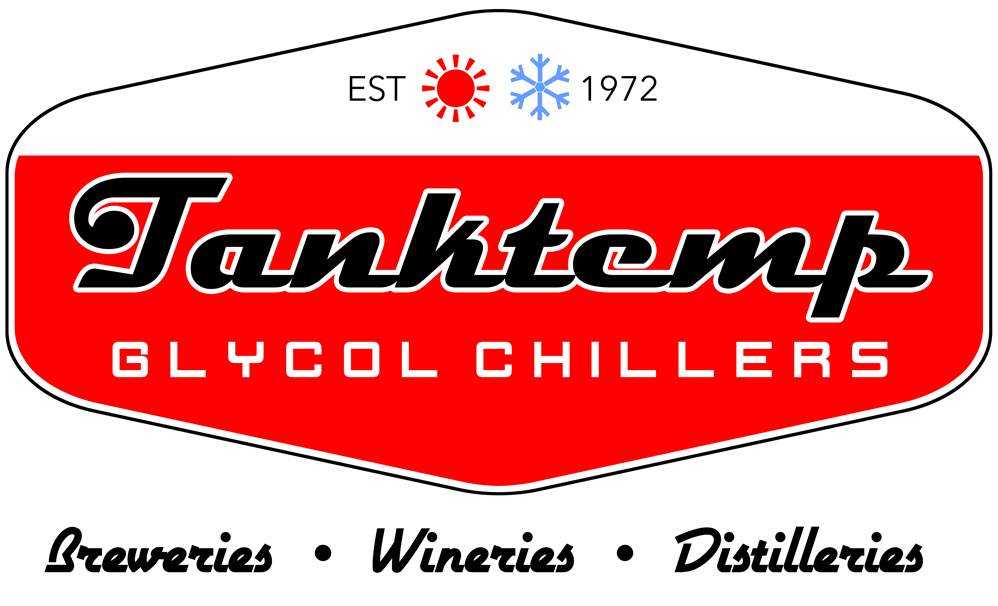
What I Wish I’d Known Before Starting a Brewery, Winery or Distillery
We chat with countless breweries, wineries and distilleries to see how the coronavirus is affecting them, and what we can do to help. I started working on this piece before the virus rocked the industry, and now is a great time to discuss it. This is by no means complete, but what is in this industry? So read, comment and reflect on. This article will grow, so check from time to time to see what else I’ve added.
What I wish I’d known before starting a brewery, winery or distillery.
Let's start with the biggest thing I saw and wish I knew before becoming a part of this industry. The sentiment I hear most is, “I wish I knew just how much fun and rewarding this would be, and I would’ve left that perfectly good paying job years earlier.”
While it's a fun job, it’s also a business and jumping from a hobby to something professional takes some planning and time.
The most important thing to understand in any brewery, winery or distillery, or really any business for that matter, is that something is always about to go wrong. In spite of that looming threat, I have found the most generous people in this industry. Many brewers, winemakers, and distillers are in direct competition with each other, yet we tend to drink (and appreciate) the beers, wines, and spirits that our friends are making. We tend to help each other out with things like advice, ingredients, and manpower. It’s like no other industry I’ve ever seen. I feel fortunate to be where I am and I love our industry.
Let’s look back at why we all got into this industry and see what we can glean on how to pull through this. Think back to the first time you said, “I think I want to start a brewery, winery or distillery!” What sparked that desire? What were the first steps you took?
Before Tanktemp, I founded a marketing and strategy group. We lived by a Sun Tzu quote as our motto, “Strategy without tactics is the slowest route to victory. Tactics without strategy is the noise before defeat.” Right now we need tactics and strategies more than ever, so here are some. We learn a lot from looking at the past to remember where we came from and guiding our paths to the future.
After years of asking groups the same questions we started to see some major trends, and I’d like to share those with you below. I’d also like to hear what you wish you had known before starting. Comment below and tell us your story.
Plan for expansions from the start
What’s one of the most common responses that we got? Planning for expansions from the start is key. If you make good beverages, people will want more!
We see groups grow faster than expected, forced to research next steps in their growth process while trying to keep up with demand. A larger brewing system is always a next step that looms over the heads of every group, and will require a change of operation and equipment in most cases. Best to plan for that change early on, so you’ll be ready when the time comes.
People are thirsty! In good times people drink, in bad times they drink more.
Costs of running a brewery and time required will be more than you plan on
In business school we are taught undercapitalization is the number one killer of any business. You know that budget you planned on and the amount of time that you think you’ll have to put into the brewery? Well, you might want to increase those numbers a bit. Always plan for everything to take twice as long and cost three times as much.
A lot of the projects we work on with groups are over a year of planning, revisions, permits, and finding. They are always a lot more than what you expect. The glycol part is easy, we can do the most complicated system in our sleep. We know chillers and will gladly work with you to get the right sized equipment for your needs. Likewise, you should seek out an experienced brewery consultant before opening to help you prepare for everything else. Breweries, wineries, and distilleries are their own beast; no other business is quite the same.
Two facets of opening a brewery, winery, or distillery we hear the most about are:
- Licensing: The licensing process is always more complicated than anticipated. Along with licenses, you must also consider taxes, fees, bonds, insurance. 70% of your time will be spent on these administrative tasks that must be done to stay in business. The reality of our industry is that it is highly regulated which can cause multiple issues throughout the licensing process.
- Labor Costs: “To achieve our proper level of service, high-quality food, and award-winning beer, labor has become more expensive than anticipated.” We hear comments like this all the time. When starting out, a core group of dedicated employees can keep everything running. But employee numbers will quickly rise, and inflate those costs more than you can imagine.
The distribution system
Another complaint we often hear about is distribution. Distributors don't push your product, they sell off your contract, and the cost for distribution keeps rising. There is also the complexity of the three-tier distribution system, and nationwide distribution of a specialty beer.
A couple of the major issues we hear about are:
- Additional tap rooms: One of the biggest discussions we have with groups is about better understanding the supply chain network as their business expands to include additional tap rooms.
- Contract brewing: There are questions from parties on both sides of the contract. Calculating brewing capacity, and partnering with premier brewers to produce beer come up most in discussions.
Packaging, canning, bottling, and Kegs.
Manufacturing beer or wine is relatively easy. Bottling and packaging is not. You now have multiple machines with multiple moving parts, heavy demands on air, CO2, and power, and a good chance that things are going to break. Bottling lines take skill, and unless a person has this experience there will be a steep learning curve. Additionally, it is not something most groups do all the time, especially in wineries. A lot of groups out source canning and bottling.The entire packaging process is complicated, but a few specific points we hear about often are:
- Labeling: Not only getting the labels to stick, but the design, printing and legal approval of them.
- Temperature: Getting the temperatures right for canning can be tricky.
- How many kegs do you need? Calculating the total volume needed is fairly straightforward. What most don’t factor in though, is how long that keg is going to be unavailable once it leaves your brewery. I have a kegerator in my house. When I first bought it I ordered three kegs from brewers. I had no idea how all that worked, I just wanted to have beer for my buddies as we worked on cars. Soon I got calls from the breweries asking for their kegs back. They were still mostly full and would take me months to drink. I never considered the cost of the keg itself and that a brewer needed to turn them.
Heating
We hear this a lot. “I wish I had known more about efficient means of water heating and putting in much larger electrical capacity.” Gas fueled heaters and tankless water heaters can be great options but they have some disadvantages. Several groups thought their tanks' water systems were the answer, however to hit the temps they required the flow rates were reduced to get the water to the temp.
When it comes to heating and cooling, don’t guess. Talk with us to find out exactly what you need.
Build outs. Equipment, install, service. And cooling.
Contractors will always find things that you and they missed in the plans and walkthroughs. A lot of your projects are in old buildings or way out in the country. Both of these present challenges when building out.
It’s so important we’ll say it again, take your timeline and triple it. Government shutdowns, licensing, regulations, and zoning are all done on other peoples schedules.
Finding local professionals to assist with installation presents another challenge. Most of the local HVAC/plumbers/electricians don’t work with breweries, wineries or distilleries on a regular basis. There are specific requirements related to how you operate that can be missed unless you do this everyday. I can’t tell how many times we have followed a plumber in that added a vent to the plumbing system.
Similarly, HVAC groups are not refrigeration mechanics. Countless times we have seen installs that pulled all the humidity out of a room, or didn’t account for venting a chiller or boiler. This topic we can go on and on about. HVAC and refrigeration are as different as mechanics and diesel mechanics. We understand each other’s world, but we have different tools, parts and gases.
We do offer our own install and to work directly with your installers if we aren’t doing the install. It is just good to do a lot of research and not try to “save money” on the expense that is driving your business success. Know the equipment manufacturer that you buy from, make sure you trust them and that they do good work.
Because we are experienced in manufacturing and installing these systems we get “this isn’t working, can you fix it” calls frequently. A lot of equipment from other manufacturers is built wrong from the start and not designed for the loads we need in this industry. It’s extremely painful to tell someone the equipment they just bought is just the wrong type of chiller, or it will not reach the temperature they want as it has the wrong compressors, gases, or condensers. Yes we work on other manufacturer’s equipment, but we can never make them work right for your needs.
Lastly, make sure you have enough of the right kind of power. There are one-phase and three-phase systems, 208-240V or 480V. Plan for this ahead of time. Equipment needs a lot of power and every day you will wish you had more.
So was there any advice that really stuck with you? Did I miss anything?
We’d love to hear your comments. What do you wish you had known before starting your brewery? If you’re thinking of starting a brewery, what are the biggest questions on your mind?
Join our mailing list update your info, white list us!
Leave a comment
Comments will be approved before showing up.
Also in the Tanktemp Blog

R22 Freon to be banned in 2020

Important changes coming in 2020


